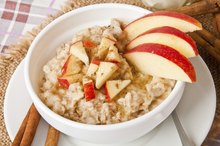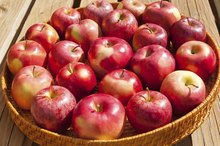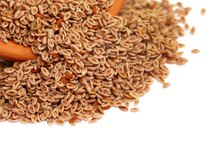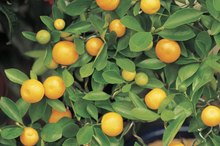Avoidable Causes of Constipation After Starting a New Diet
Starting a new diet to lose weight, manage your blood sugar levels or reduce your risk of chronic disease might change your bowel patterns, especially in the first phases. If you’re on a diet that restricts certain food groups or requires that you increase your intake of other foods, your body might respond by producing hard, infrequent stools. It can be frustrating if you're eating healthy but constipated. If you’re having fewer than three bowel movements per week and your stools are difficult to pass, consult your health-care provider about modifying your new diet to restore healthy bowel patterns.
Eating Healthy, but Constipated
When you reduce the amount of vegetables, fruits and whole grains in your diet, you restrict your intake of fiber, an indigestible plant substance that facilitates the passage of digestive wastes through your intestinal tract. A high-protein diet also might require extra water to metabolize proteins, which can result in dehydration. To maintain a normal fluid balance, drink at least eight 8 oz. glasses of water or other non-caffeinated fluids each day. If you’re monitoring your carbohydrate intake, focus on high-fiber carbohydrates such as:
- brown rice
- whole wheat cereals
- raw vegetables
- fruits
- to regulate bowel movements
- When you reduce the amount of vegetables, fruits and whole grains in your diet, you restrict your intake of fiber, an indigestible plant substance that facilitates the passage of digestive wastes through your intestinal tract.
High-Fiber Diets
Foods That Help Clean the Impacted Feces From Your Colon
Learn More
Paradoxically, adding too much fiber to your diet before your body adjusts to the extra roughage can cause constipation. If you’ve started a healthy eating plan to prevent cancer or heart disease by increasing your intake of vegetables and fruits, you might end up with large, hard stools that are difficult to pass. To prevent constipation after starting a high-fiber diet, increase fiber gradually until you reach your desired intake. The American College of Gastroenterology, or ACG, recommends that you aim for 20 to 35 g of fiber each day to maintain digestive health 2.
- Paradoxically, adding too much fiber to your diet before your body adjusts to the extra roughage can cause constipation.
Inadequate Fluid Intake
A low fluid intake is one of the reasons for constipation. If your diet restricts certain foods or beverages, you might inadvertently limit your fluid intake, which could lead to dry, hard stools. Eat regular servings of fresh fruits, vegetables and other foods with a high water content to boost your intake of liquids. If you’re trying to cut down on your consumption of soda, sugary tea or energy drinks to cut calories, replace those fluids with water, herbal tea or fruit juices diluted with mineral water to maintain a healthy fluid balance and promote normal bowel movements. Avoid caffeinated beverages, which can cause dehydration, to help prevent constipation.
- A low fluid intake is one of the reasons for constipation.
- If your diet restricts certain foods or beverages, you might inadvertently limit your fluid intake, which could lead to dry, hard stools.
Good Fiber Sources
Diet After an Anal Fistula Surgery
Learn More
To prevent the complications of constipation and maintain a healthy digestive tract, include a variety of high-fiber foods in your diet. Insoluble fiber is a rough, indigestible form of plant material that helps digestive wastes move through your colon. Soluble fiber, which turns into a jelly-like substance in your intestinal tract, adds moisture to stools and keeps them soft. Insoluble fiber is found in whole grain cereals or breads, raw vegetables and fruits. Oatmeal, dried beans, citrus fruits, apples and pears are rich in soluble fiber. If eating a variety of high-fiber foods and increasing your intake of liquids don’t restore your usual bowel activity, talk with your health-care provider about supplements or treatments for relieving constipation.
- To prevent the complications of constipation and maintain a healthy digestive tract, include a variety of high-fiber foods in your diet.
- Insoluble fiber is a rough, indigestible form of plant material that helps digestive wastes move through your colon.
Related Articles
References
- MayoClinic.com: High Protein Diets: Are They Safe?
- American College of Gastroenterology: Digestive Health Tips –- Patients
- American Council on Exercise: Q: Are There Any Risks Associated with Excess Protein Consumption?
- Harvard School of Public Health. http://www.hsph.harvard.edu/nutritionsource/carbohydrates/fiber/
- University of Maryland Medical Center. http://umm.edu/health/medical/altmed/supplement/fiber
- USDA.http://www.ers.usda.gov/topics/
- Dahl WJ, Stewart ML. Position of the Academy of Nutrition and Dietetics: Health Implications of Dietary Fiber. J Acad Nutr Diet. 2015 Nov;115(11):1861-70. doi: 10.1016/j.jand.2015.09.003.
- Francesca De Filippis, et.al. High-level adherence to a Mediterranean diet beneficially impacts the gut microbiota and associated metabolome. Gut, 2015; gutjnl-2015-309957 DOI: 10.1136/gutjnl-2015-309957
- Harvard School of Public Health.
- University of Maryland Medical Center.
- USDA.
Writer Bio
Anne Tourney specializes in health and nutrition topics. She is a registered nurse with experience in medical-surgical nursing, behavioral health and geriatrics. Tourney earned a Bachelor of Science in nursing from Regis University.









